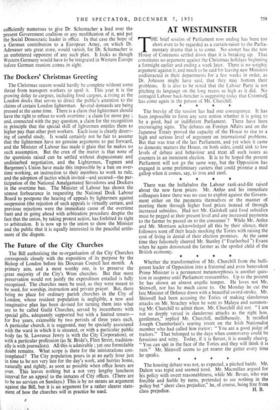The Future of the City Churches
The Bill authorising the re-organisation of the City Churches corresponds closely with the exposition of its purpose by the Bishop of London before his Diocesan Council last month. A priMary aim, and a most worthy one, is to preserve the . great majority of the City's Wren churches. But that mere preservation would not justify the expenditure entailed is fully recognised. The churches must be used, as they were meant to be used, for worship, instruction and private prayer. But, there being no place for ordinary parish churches in the City of London, whose resident population is negligible, a new and imaginative plan has been devised for turning them into what are to be called Guild Churches, served by incumbents with special gifts, adequately supported but with a limited tenure— for five years, extensible by two periods of three years each. A particular church, it is suggested, may be specially associated with the ward in which it is situated, or with a particular public body (as St. Lawrence Jewry is with the City Corporation), or with a particular profession (as St. Bride's, Fleet Street, tradition- ally is with journalists). All this is admirable ; yet one formidable doubt remains. What scope is there for the ministrations con- templated? The City population pours in at an early hour just in time to be not very late for the day's work, and hurries home, naturally and rightly, as soon as possible when office hours are over. This leaves nothing but a not very lengthy luncheon interval for an appeal to the inmates of City offices. (There are to be no services on Sundays.) This is by no means an argument against the Bill, but it is an argument for a rather clearer state- ment of how the churches will in practice be used.


















































 Previous page
Previous page